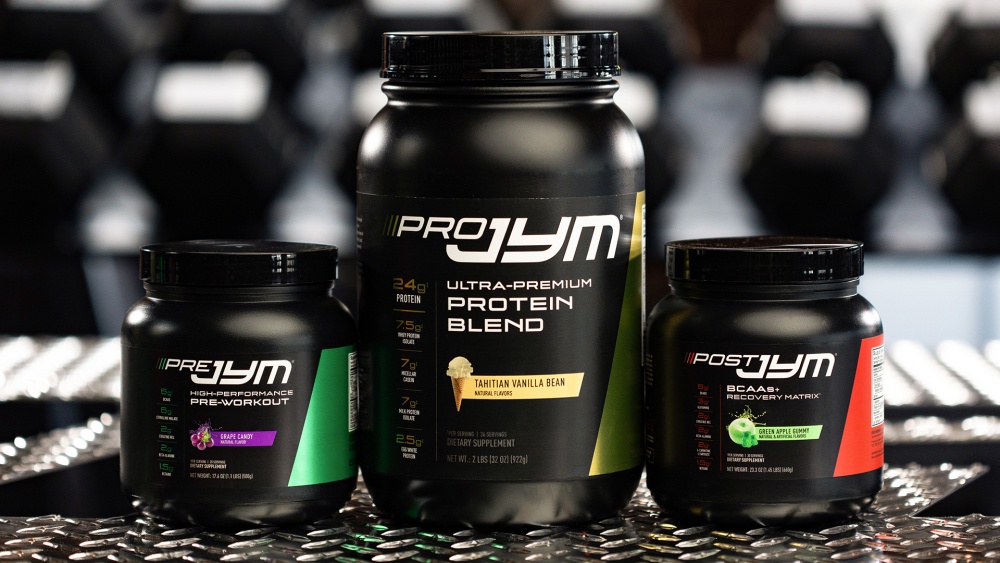Research Update: Muscle-Saving Supplements
Leaning out is often accompanied by a subsequent loss in muscle mass (boo!), but two supplement ingredients in particular can help you hold on to your size when you're getting shredded.

Leaning out is often accompanied by a subsequent loss in muscle mass (boo!), but two supplement ingredients in particular can help you hold on to your size when you're getting shredded.

By Tim Scheett, PhD – Director of Research, PhD Fitness
If you've ever followed a respectable fat-loss diet and stuck to the plan, you most likely enjoyed seeing a leaner, more shredded physique in the mirror. Unfortunately, there's probably one other thing you noticed: a little bit less muscle than you had before you started leaning out.
You're not alone. People have been sacrificing hard-earned muscle mass for fat loss for as long as guys have been uttering the statement, “I’m gonna bulk up now and then I’ll get shredded in time for summer.”
Are you tired of seeing a significant amount of muscle go away when you get shredded? Then don't let it happen. Instead, hold on to your lean mass while stripping away body fat with two key supplemental ingredients: whey protein and branched-chain amino acids. Jim Stoppani includes these key players in Pro JYM (whey), Pre JYM (BCAAs) and Post JYM (BCAAs) for a reason: Because the last thing he wants to do is lose size when he's getting shredded – and he doesn't want you to either. Jim has been touting the benefits of whey and BCAAs for years, and a pair of recent studies lend even more credibility to his recommendations, specifically for those following fat-loss diets.
Recently, Dr. Wes Dudgeon and I published two peer-reviewed research papers in the Journal of the International Society for Sport Nutrition (link to study here) and the Journal of Strength and Conditioning Research (link to study abstract here) demonstrating that men taking either whey protein or a branched-chain amino acid (BCAA) supplement along with resistance training and following a reduced-calorie diet were able to lose fat mass (i.e. get shredded) while also maintaining or increasing their muscle mass.
It's very common for anyone purposely trying to drop body fat to also lose some muscle mass. Research has shown that this loss of mass can usually be attributed to reduced calories. When calories are reduced and activity level remains the same or increases, the body ends up being in what's known as negative caloric balance, where it's taking in fewer calories than it's burning. Oftentimes the body isn't getting the necessary amounts of amino acids it needs, so after tapping out the body’s free amino acids it will begin to break down its own muscle mass to get the needed protein. When this happens, you end up losing some of that hard-earned muscle you just spent the past several months training your ass off to gain. Who wants that??? Yeah, me neither.
The natural question then becomes: What can I do to keep this muscle I worked so hard to gain? Well, the easiest thing you can do is supplement your weight-loss diet with either whey protein or a BCAA supplement, preferably both. The results of our two studies showed that the use of whey or BCAAs while following a calorie-restricted diet provided the subjects sufficient nutrients to prevent losing muscle mass while at the same time losing body fat.
For these research projects, subjects performed resistance training four days a week for eight weeks using a bodybuilding-style split resistance-training program in conjunction with pre-, during-, and post-training consumption of either whey protein or BCAAs. Control subjects consumed a calorically equal carbohydrate-based nutritional supplement.
At the end of the study, data analyses showed that consuming whey protein in a shake allowed the subjects to lose 5.5 pounds of fat while not losing any of their muscle mass. These changes allowed the subjects to lose 2.7% body fat during the eight-week study. On the other side, subjects that consumed a BCAA supplement lost 1.1 pounds of fat while gaining 0.9 pounds of lean mass. These changes allowed the subjects to lose 0.7% body fat during the eight-week study.
In addition to the positive muscle- and fat-mass changes, both studies showed that supplementation with either whey protein or BCAAs resulted in muscular strength and local endurance increases. Subjects consuming the whey supplement increased their bench press by an average of nine pounds and their squat by 24 pounds and an average of two reps per set during the eight weeks. The subjects consuming BCAAs increased their bench press by an average of 16 pounds and their squat by 33 pounds, as well as two additional reps per set during the eight-week training program.
Meanwhile, the carbohydrate control group saw a decrease of eight pounds on their bench press while gaining just 11 pounds on their squat in eight weeks. (It's typical for people who lose muscle mass during a calorie-restricted diet to also lose muscular strength.)
Performance-wise, subjects using the whey-protein supplement had a two-times greater increase, and the BCAA supplement subjects a three-times greater increase, in their lower-body muscular performance (i.e. back squat), as compared to the placebo subjects.
The fact that the subjects supplementing their diets with either whey or BCAAs actually gained or retained muscle mass, gained strength, gained local muscle endurance and increased performance while losing body fat was remarkable and resulted in the best possible outcome. These combinations of diet, training and supplementation created the near perfect storm, so to speak. This didn’t just happen by random chance, nor was this study simply a shot in the dark. The concept for these two projects grew from various discussions I had over a few years with friends, colleagues and students of mine when I was a college professor.
During the first year of my doctoral work at the University of Connecticut, I volunteered to help collect data for Dr. Sharon Miller’s dissertation, in which she determined that a carbohydrate supplement was actually more beneficial than a protein supplement for preventing muscle-mass losses during a two-hour treadmill run in endurance athletes. One thought was that providing the subjects with protein during exercise would prevent the body from breaking down its own muscle. Her study showed that it was the carbohydrate supplement that worked the best because the exercise intensity of the subjects required more fuel to maintain metabolism at a high enough rate to support the energy demands during the two-hour run. Supplying the body with carbohydrates provided a quick fuel source that supplied the body enough fuel so that it didn’t need to break down its own muscle as a fuel source. Using these findings, I initially hypothesized that feeding the body protein would provide the needed building blocks (amino acids) for muscle-protein synthesis, which would spare the body’s own muscle protein from being broken down.
When designing the resistance-training program and the caloric-restricted diet (commonly referred to as a ‘cut diet’), I consulted two industry experts – Dr. Jim Stoppani and Mr. Chuck Rudolf – to ensure we were using real-world practical and applicable hypertrophy training and cut-diet programs rather than research-derived programs that were neither realistic nor applicable. The results of the studies confirm that the resistance-training program and caloric-restricted cut diet were effective in decreasing fat mass while also stimulating muscular strength and local endurance gains.
A quick commentary on programming in research studies: Any training program that results in the control or placebo groups not gaining strength or local endurance most likely undertrained the subjects for their current fitness level. Anyone effectively training for eight weeks should experience an increase in strength and/or endurance unless the training program is too stressful (overreaching) or caloric intake is insufficient to support the training load. Yes, some researchers have designed poor training programs in published studies; this happens all too often.
The best physiologically possible body composition outcome for an individual performing resistance training while intentionally trying to lose body fat through restricting calories is to maintain their pre-diet muscle mass while losing fat mass. Very few athletes who reguarly cut weight (e.g. MMA fighters, boxers, wrestlers, bodybuilders, dancers, etc.) are able to lose body fat without simultaneously losing muscle mass. These athletes often maximize muscle mass and muscular performance (power and strength) gains in the off-season, knowing they'll lose a significant amount of muscle mass and muscular performance as they cut their body weight to achieve their target performance weight.
A very low-calorie supplement that could help these athletes maintain their hard-earned muscle mass and muscular performance gains while still cutting body fat would be ideal. And what might this supplement be? Whey protein and/or BCAAs, based off of the results from the independent university-based studies I covered here. During caloric restriction, the body’s typical response is to utilize available energy sources (both lipid and muscle) to provide the necessary calories for survival. So, to be able to maintain lean-tissue mass and lose fat mass during caloric restriction is an ideal outcome.
These studies are support for individual ingredients (whey protein and BCAAs) contained in Pre JYM, Pro JYM and Post JYM. These JYM products, of course, contain more than what was tested in these research projects; therefore, I’d expect to see even greater results using Pro JYM to account for the whey protein (while also reaping the benefits of casein and egg proteins) and Pre JYM and Post JYM for the BCAAs (while also getting other proven effective ingredients like betaine, beta-alanine and creatine, among others).
Research is pretty clear that supplementing with whey protein or BCAA increases muscle-protein synthesis when sufficient calories are provided. Now there are two published peer-reviewed studies showing the benefits of whey protein and BCAAs to help prevent muscle-protein loss while also cutting weight (losing body fat). Given the overall benefits from whey protein and BCAA supplementation, there's little reason for someone serious about his or her physique and performance not to use these supplements on a regular basis.
References:
Dudgeon WD, Kelley EP, and Scheett TP. In a single-blind, matched group design: branched-chain amino acid supplementation and resistance training maintains lean body mass during a caloric restricted diet. Journal of the International Society of Sports Nutrition. 13:1, 2016.
Dudgeon WD, Kelley EP, and Scheett TP. Effect of Whey Protein in Conjunction with a Caloric-Restricted Diet and Resistance Training. Journal of Strength & Conditioning Research. ePub ahead of Print, Post Acceptance: September 10, 2015
Related Articles